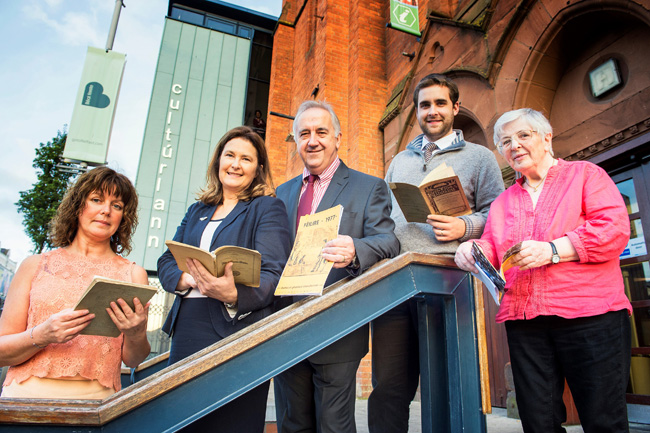|

Pictured at the launch of the north of Ireland's first Irish language archive at An Culturlann in Belfast are (from left to right):
Máirín Ní Dhuibhir (Librarian at Coláiste Feirste), Gabrielle Nig Uidhir (St Mary’s University College),
Martin McDonald (Interim Chair, Heritage Lottery Fund), Darren Ó Dochartaigh (Líofa Development Officer, DCAL),
and Bríghid MacSeáin, who donated a variety of records to the archive.
Culture Minister, Carál Ní Chuilín, has hailed the first ever dedicated Irish language archive in the north of Ireland.
The archive, held at Coláiste Feirste and St Mary’s University College in Belfast, contains thousands of records and spans
more than 100 years. It charts the revival of the language, in particular since the 1950s, and includes photographs, letters, books,
newspaper clippings and other records of interest.
Speaking about the archive, the Minister said:
"Irish is a language for everyone and is enjoying a huge upsurge in popularity. More people are taking up the Líofa challenge to
begin learning Irish or grow their existing ability, and more people are speaking it in everyday life – in schools, cafés, in their
social activities and in public forums like council chambers and the Assembly."
"It was not always like this, however. Although Irish has been spoken in Belfast continuously for centuries, by the 1950s
its usage was confined to a small number of dedicated clubs and societies. Since then, thanks to the passion and commitment of a
small group of Irish speakers, including those who founded the Shaws Road Gaeltacht, we have seen take-up of Irish steadily grow.
Indeed we now have thousands of children receiving their education, from pre-school through to post-primary, through the medium of
Irish and it is the fastest growing sector of the local education system."
"This new archive tells, for the first time all in one place, the full story of this revival, using artefacts that deliver a
tangible and exciting connection to historical events. The archive will be of interest to future generations of Irish learners
and historians, as well as to tourists and anyone seeking to find out more about Belfast’s rich cultural heritage."
The Minister highlighted how the Líofa campaign has contributed to the recent increase in Irish speaking: "I launched Líofa in 2011
with the aim of making Irish accessible to all and increasing its general use. Since then more than 13,000 people have signed up
and I recently set a new target of 20,000 people increasing their fluency by 2020."
"As the revival and growth of Irish continues, this archive will also grow and take on increased significance as more people
seek to learn about the language's history."
In conclusion, the Minister said:
"My congratulations and thanks go to everyone involved in establishing this wonderful venture, including all those who
have contributed items for the archive, and to the Heritage Lottery Fund and Foras na Gaeilge for their financial support."
|



